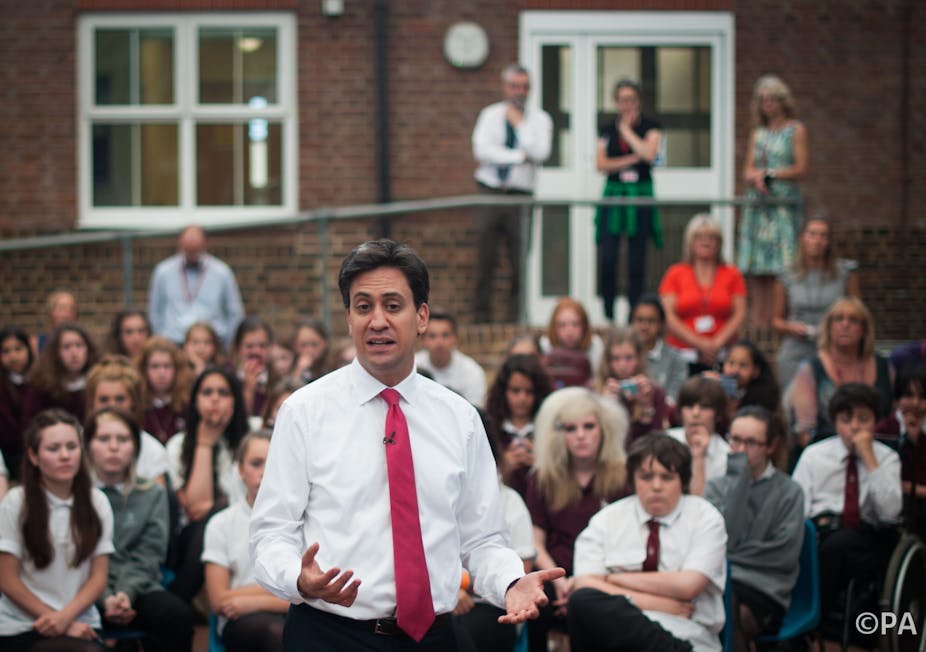Young people’s relationship with politics in Britain is often considered to be both complex and problematic. On the one hand, this generation is often characterised as apathetic, with no interest in, or support for, the democratic process. On the other hand, when they do take part in mass social and political actions (such as student demonstrations in Britain and the global “Occupy” movement) they are roundly criticised.
Only 44% of 18-24 year olds voted in the 2010 general election, which was significantly lower than the national adult turnout of 65%. Their lack of presence at elections is a major concern to politicians, prompting proposals such as compulsory first-time voting as well as Labour Party leader Ed Miliband’s recent call for lowering the voting age to 16.
We have been considering why young people do not vote and what might be done to re-engage them. In 2011 we conducted an online survey with 1,025 young adults who were aged 18 at the time of the 2010 UK general election. Perhaps surprisingly, given the way that they are often characterised, our survey results indicate that nearly two-thirds (63%) of young people claim to have at least some interest in politics. They are also more likely than not to express broad support for the democratic process, and approximately half state that they are committed to the principle of voting (57%) and of the value of elections (48%).
So it’s not that young people don’t want to vote. Indeed, the majority of our 18-year-old respondents said they were considering voting at the next election (64%). However, their first experience of a general election in 2010 left many feeling deeply frustrated. The results from our project reveal that they consider professional politicians to be remote and self-serving, with no commitment towards championing young people’s concerns. The overwhelming majority (81%) hold a negative view of the political classes, with very few admitting any trust in either the parties (8%) or in politicians (7%).
How to reconnect
So what might be done to re-connect today’s youth generation to the formal political process? In our research study, we asked young people if the introduction of compulsory voting would make a difference to their turnout in future elections. As table 1 reveals, 28% of those who didn’t vote in 2010 said that compulsory voting would make no difference – and that they would continue not to vote in the future. Furthermore, twice as many previous non-voters (12%) than voters (6%) stated that they’d actually be less inclined to vote in the future should compulsory voting be introduced.

Projecting forward, our results in table 2 reveal important attitudinal differences between those already planning to vote at the next general election, and those intending to abstain. Over half (58%) of those reporting that they were already very unlikely to vote felt that compulsory voting would make either no difference to this decision (38%), or indeed make them even less likely to vote (20%). From this we can infer that the introduction of compulsory voting would merely serve to reinforce existing feelings of resentment.

If compulsory voting is not the way forward, what might be done? What is needed is a thorough-going review of the way in which formal politics reaches out to, and prepares young people for, political participation. Young people are open-minded about electoral politics and do not have a hardened disaffection. They are more likely than not to express faith in voting and the democratic process although not with the politicians that inhabit that world.
A reduction of the voting age so that 16 and 17-year-olds are eligible to vote in all future elections might well help to convince young people that they are valued by the political class, rather than maligned and excluded. This may help to convert democratic commitment into democratic participation. This should be tied in with measures to extend and enrich the citizenship curriculum in schools to improve young people’s political literacy and help make the idea of democratic participation second nature.
Furthermore, a system to encourage young people to think positively about elections and to register to vote is needed. The introduction of individual registration later this summer is worrying from a practical point of view - evidence suggests that younger people, those on lower incomes, and society’s most vulnerable groups are least likely to register to vote. Instead, electoral registration educational campaigns should be supported and resourced by central government. Furthermore, practical measures such as keeping schools open on polling day so that young people can easily cast their vote while at school and allowing Election Day registration in schools might also help to boost young people’s turnout at elections.
This article is based on a longer chapter published in a collected volume by the Political Studies Association, Beyond the Youth Citizenship Commission: Young People and Politics, downloaded from http://www.psa.ac.uk/psa/news/psa-publishes-beyond-youth-citizenship-commission-volume.

